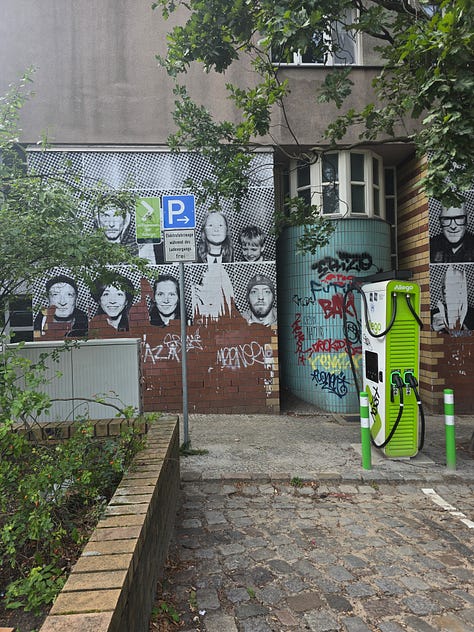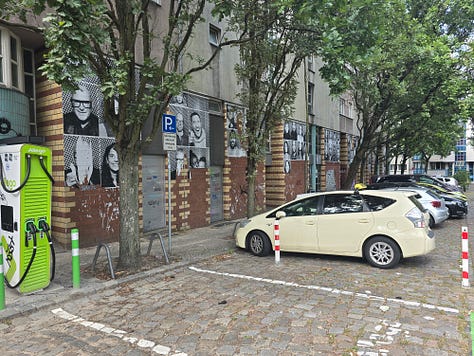I’m still slightly behind on my drift, the Friday deadline is a little slack at the moment. The world is a curious place to live in if you try and pay attention to the movements of political power. To pay attention to something is, of course, a kind of work. That’s how I understand the concept of an attention economy, as a kind of work.
There still seems to be something derivative, however, when it coms to subjective things like attention. Attention only becomes an issue when it’s freed from necessity, only becomes an issue when it is, to some extent, capable of being free. “Necessities of life”. Someone might shout out “This is what we should really think of when it comes to work”. And to a large extent I think this is right, I understand it, yes, work hard if you want those necessities, do the necessary work. All true. Which is why the refusal of work begins to sound interesting.
The moment we think of work beyond necessity it offers some possible freedom. It’s this connection to freedom that makes the focus on autonomy and the idea of the refusal of work resonate. You can see this in some of the communes, intentional communities. A value given to work as a form of life of the ideal of freedom, to live autonomously. A value only beyond necessity however. A value explicitly material in its limit to abstract universality. “It’s not always the case that work is a form of life of freedom”. What form might the material value of work take, over and above, within and beyond, the capitalist form of value extraction?
Labour, production, and producers have been at once the strength and weakness of the communist tradition. But was it supposed to be emancipation from work or through work? The ambiguity has never been cleared up. We must not take labour, whatever it may be, as our starting point but always the refusal of work. (Lazzarato, Governing by Debt, p246)
In the last chapter of his work on debt, Conclusions for a beginning: the refusal of work, Lazzarato doesn’t sum up what he’s been arguing about the role of debt in the contemporary moment of the appropriation of wealth. He doesn’t close the work with a quick review of the path he’s just walked. Rather he opens the work out by a series of notes that try to locate the refusal of work as a form of what I would see as disalienation1.
For example he extends the concept of the refusal of work beyond its basic setup. On the one hand we can understand the refusal of work as the resistance to alignment2.
Frederic Lordons work Willing Slaves of Capital3 is an excellent account of the movement of capital, the movement of managers and bosses, in their attempt to align the desires of the worker with the boss, with the management of capital. This alignment of desires operates as a kind of complicity in spite of itself, the idea being to establish alignment in order to extract the intrinsic motivations, the desires, of the worker in the service of the job. This is the realm of the enjoyable job, the fulfilling job, the motivated worker, the one who thinks and does work not just outside standard operating hours but almost as part of their existence. Their being is turned towards the job and this is validated as a kind of heroism or competence. So in one sense the refusal to work is the deliberate resistance to this process of alignment. That can take many forms, from laziness, minimal effort, chucking sickies and phoning it in, all the way through to malicious compliance and sabotage.
On the other hand, beyond this specific relation to the lived reality of work, waged work, beyond this resistance to alignment, there is a wider concept, more socially focused. More universal or at least more extensive in its reach.
The refusal of work does not only concern workers; it specifically and above all means not wanting to be assigned a function, a role, and an identity predetermined in and by the social division of labour. From this perspective, factory worker, artist, woman, and ‘cognitive worker’ are exactly the same thing - assignations. With or without a direct boss, all are caught up in relations of exploitation and dominance. (Lazzarato, ibid, p248-9, emphasis added)
This movement up (“above all”), this elevation of the concept of the refusal of work beyond the realm of productivity, beyond the resistance to alignment, rests on this rejection of the assignment. To be assigned ones place in the world was the great principle of feudalism and the order of being instituted and maintained as a theological world. To be free of such tradition and pre-natal capture, to be free of an imposed 'place in the order of being’ was the great call of the liberal model of meritocratic work. You would get what you produced by your labour and talents, rather than accept what was given by tradition and God.





This shift, from accepting an order of being to the production of the self, is a messy process, but involved breaking up the existing territories of life. In practice this might appear as an ideological - subjective - process, but only in retrospect. In practice it involved expulsion and enclosure. Only afterwards did understanding attempt to justify the appropriation in ideas of freedom and an open horizon of roles (“you can be anything you want to be!”). It was a rejection of assignment by birth that lies at the heart of the construction of the wage labourer. So Lazzarato’s argument that the refusal of work involves a new moment of the rejection of assignment points to a transition analogous to the shift from feudal to wage forms of labour. No longer, however, a rejection of assignment by birth, the rejection of assignment now pushes back against the “social division of labour”. Yet this perhaps begins to reveal a problem.
The problem, put bluntly, is whether we are to reject any social division of labour or particular kinds of such division. In the move from feudal to wage labour the conceptual framework shifts its explanatory basis from something fixed, such as tradition or theology, towards something flexible in form but totalitarian in content, the increase in productivity. The new rejection of asignment appears to want to maintain that flexible form whilst realigning the content away from increasing productivity to something like ‘life’.
There are a million potential pitfalls every time the concept of ‘life’ is deployed and relied on. It’s vagueness and romantic content often overwhelm any argument by effectively placing the opponent into the role of death bringer, life extinguisher. At the same time it points to something beyond this time. Something beyond this particular way of doing things. It also points to something that is perhaps hidden in the bare talk of life, which is a kind of hope for a future of work that isn’t misaligned with regard life.
Work without Hope draws nectar in a sieve,
And Hope without an object cannot live.
Coleridge, Work Without HopeI use this concept of disalienation in part as derived from the work of Camille Robcis by that same name, a text that focuses on the institutional psychoanalytic movement. Disalienation - Politics, Philosophy, and Radical Psychiatry in Postwar France, Chicago 2021.
It’s interesting to note that there is much debate in the field of machine learning and intelligence around this concept of alignment - there, more often than not, the issue is naively posed in ‘universal’ terms, as alignment with ‘human values’ (as though there were not precsiely an already existing and ongoing struggle over those values at the heart of human society). ‘Never forget the class war’ is the simple methodological principle that should be used to prevent such naivete.
Willing Slaves of Capital: Spinoza and Marx on Desire, Frederic Lordon, Verso 2014.




